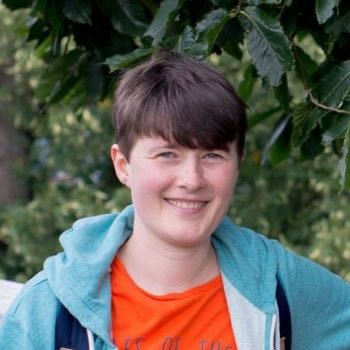Martha Tatarnic is the incumbent at St George, St Catharines in Ontario and is the author of Why Gather?: The Hope and Promise of the Church, which published with Church Publishing in June this year. You can read a review of Why Gather? in the September 2022 issue of Faith Tides. Below, Faith Tides editor Naomi Racz talks to Martha Tatarnic about writing a book during a pandemic and the future of the Church.
Q: One of the things that struck me is that you say you started the book in 2018, before the pandemic. But the pandemic feels very central to the book and it seems like it informed the ideas that you explore in the book. I was wondering, what did that book in 2018 look like? How did it change as you were writing it and living through the pandemic? Would it have been a very different book, do you think, without the pandemic?
A: Yes, I’m sure it would’ve been. I think that the pandemic brought a lot of things to light in a way that was hard to turn away from. When I started writing the book, as I note, it came out of a conversation around faith with my son and my answer to him was to stay close to the Church, which seemed to require, in my own mind, some justification.
I think that for any of us who have served in the mainline church for any length of time, we’ve kind of been steeped in the question of the church’s survival. I’ve never really lived in a church where that hasn’t been the case. The institutional church has been in decline longer than I’ve been alive. And so, the initial question back in 2018 was why we might want to stay close to the Church anyway. How does the community of faith help me to be a believer? And why does that matter?
Well, all of a sudden with COVID-19 happening, with all of our normal patterns of church suspended, and the needs of the world very urgently defined, it seemed like those answers needed to be a lot more thoughtful and a lot more responsive, not just to us as individuals, but to us as a world in crisis.
Q: What I’m hearing is that a lot of churches are saying their in-person numbers are not what they were before the pandemic. So it also seems like it’s something that’s precipitated that decline even further. Although, it has also opened up in some ways. A lot of churches are seeing online participants coming from further afield or who wouldn’t have been able to attend before. So it’s kind of interesting that there’s this dynamic there as well.
A: Well, that changes the nature of community and it changes the ways in which we learn from one another in that walk of faith. It certainly demands a lot of questions around how we create authentic community online where there is something more than just consumer choice at work, that we’re invited to learn and grow and serve and offer as well, even if we’re not in person. I think everybody would say that the institutional decline that we’ve seen for decades was very much heightened by COVID-19.
Q: You have this idea in the book that we’re infected with one another. Was that an idea that came out of the pandemic or is that something you were kind of aware of and it just gave you this useful metaphor to talk about it?
A: I guess I would say yes and yes. My previous book is called The Living Diet and it talks about our relationship with food and our bodies. And, I sort of hammer away at, throughout that book, that eating is an active relationship. We cannot, as bodies in this world, exist without taking in life from outside of ourselves, into our bodies. It’s not a spiritual statement; that’s a biological statement. And it’s a statement that is reinforced every time we put food in our bodies.
So that’s definitely a premise that I’ve been very aware of for a long time. And I think it informs a lot about how we understand not just our relationship with our bodies and food, but also the threads through scripture around eating and around knowing God and knowing God’s love as a meal or a banquet or food, and Jesus’ choice of using food to describe his own life.
But, definitely, then the pandemic gave me another angle on that language, because I very quickly realized, nobody’s talking about stopping the spread of COVID-19. Those horses are out of the barn because once it gets into our airstream it’s out there. The air is going to circulate this thing all across the globe. All we could talk about was flattening the curve because we’re infected with each other. I am currently breathing in air that somebody else has breathed out. That is just a biological premise.
Q: There’s this really vivid scene in your book where you describe the Eucharist and people gathering together and how horrifying it seems now that you drink from this cup that is full of backwash and crumbs. And you say you don’t know if we’ll ever go back to that necessarily. But do you see positive changes that are coming out of that? Not just, you know, we’re losing numbers, we’re losing practice, but positive ways that it’s changed the Church?
A: Yes, I hope that those positive ways are very evident in the book. But I think it is essential that we move away from the question of mere survival to the question of why it matters at all. When I first got the copies of the manuscript from my publisher, they had a typo on every single page because rather than the title of the book saying “Why Gather?” every single page said “Why Bother?” That’s the question, right? Why bother? Who cares if we all just enjoy the Anglican club. That’s not something I’m going to devote my life to, propping up people’s hobbies. But what is the essential offering of the Church to the world? That’s a really interesting question, a way more life-giving question than just survival. And I do think that that suspension of our regular patterns of gathering in worship put into sharp relief why it matters to us; why bother?
Q: Could you just explain ultrarealism and how you went about applying it — you talk about it being a running concept — how you went about applying that to the church. Those seem like quite different things.
A: I came across the concept through long distance running, but it is a mental fitness technique rather than an exercise technique. So it is the act of seeing, accepting and embracing what is actually happening rather than getting freaked out about what might happen or what you wish were different.
So, in running, it’s easy to start out running and feel like, I wish it weren’t raining and I wish I didn’t have this cramp in my side and I think I have to pee and I have only run one kilometre and I have 29 to go. How am I going to do this? And I feel tired already. You can just be done before you even start because you can completely talk yourself in circles. But if you really focus on what is actually happening… So right now, I’m running and it’s okay. That is a powerful technique in terms of any endurance sport. I think there’s a clear metaphor there for just being a human being, right?
How much time do we devote to wishing or worrying? It’s like that “live in the moment” hashtag. But in terms of the life of the Church, again, as somebody who’s been steeped in the institutional decline of the church my whole life, I just think we spend so much time lamenting that we’re not different and wishing that we had people that we don’t have and wishing that we had buildings that we don’t have and wishing and worrying about what’s next. That’s not a really compelling invitation for people to check us out.
“We want more young people” is not really an exciting invitation to anybody. But apply that ultrarealism to the life of the Church. Well, what’s happening right now is here’s a gathering of people who have been touched by God in some pretty profound ways and have incredible stories of transformation and hope and generosity and service and love. That’s why they’re there. What’s happening right now, that’s a pretty important thing to see and then to embrace and to offer.
Q: You do have an answer to this question of “Why Gather?” but you certainly say that you’re not there to offer concrete solutions or do X, Y, Z, and suddenly you’ll have a flourishing church. What really struck me is that each chapter ends with this list of questions. And I think I have walked away from reading it with a lot of thoughts mulling around. Was that your intention? Were you conscious of doing that with the book, that it was going to prompt a lot of questioning rather than just laying out answers?
A: Yes. I would be really nervous to advertise myself as somebody who has all the answers. And also, as somebody who has spent my whole life in the mainline church, my experience of religion is not one of, you know, here’s all of the black and white answers. And if you do all of these things and don’t do all of these things, then your soul will be saved and you’ll go to heaven and too bad about all the other people. That is not my experience of religion at all.
My experience of religion is very much about that faith community that discerns and questions and shares and collaborates and wonders. And the inquiring and discerning hearts that we talk about in the prayer of baptism, that is my experience of religious community. So it would be really out of character for me to write a book promising answers.
I do think that if there is a conclusion in the book, it is very much that those stories of how our lives have been touched and transformed by God need to be lifted up and shared. And that that blesses the world around us in a whole bunch of pretty beautiful ways. I do think that that witness of community, of embracing the infection, of embracing the reality that we’re stuck with one another is a really important counterpoint to a lot of the most urgent crises in front of us as humanity.
Because I think if you look at the environmental crisis, if you look at the opioid crisis, if you look at Black Lives Matter and Truth and Reconciliation and all of the most urgent questions in front of us right now, you can boil them all back to trying to live outside of the relationship for which we’re created, trying to live outside of that basic responsibility to one another and the basic premise that we can’t have life without tending to all the life around us.



